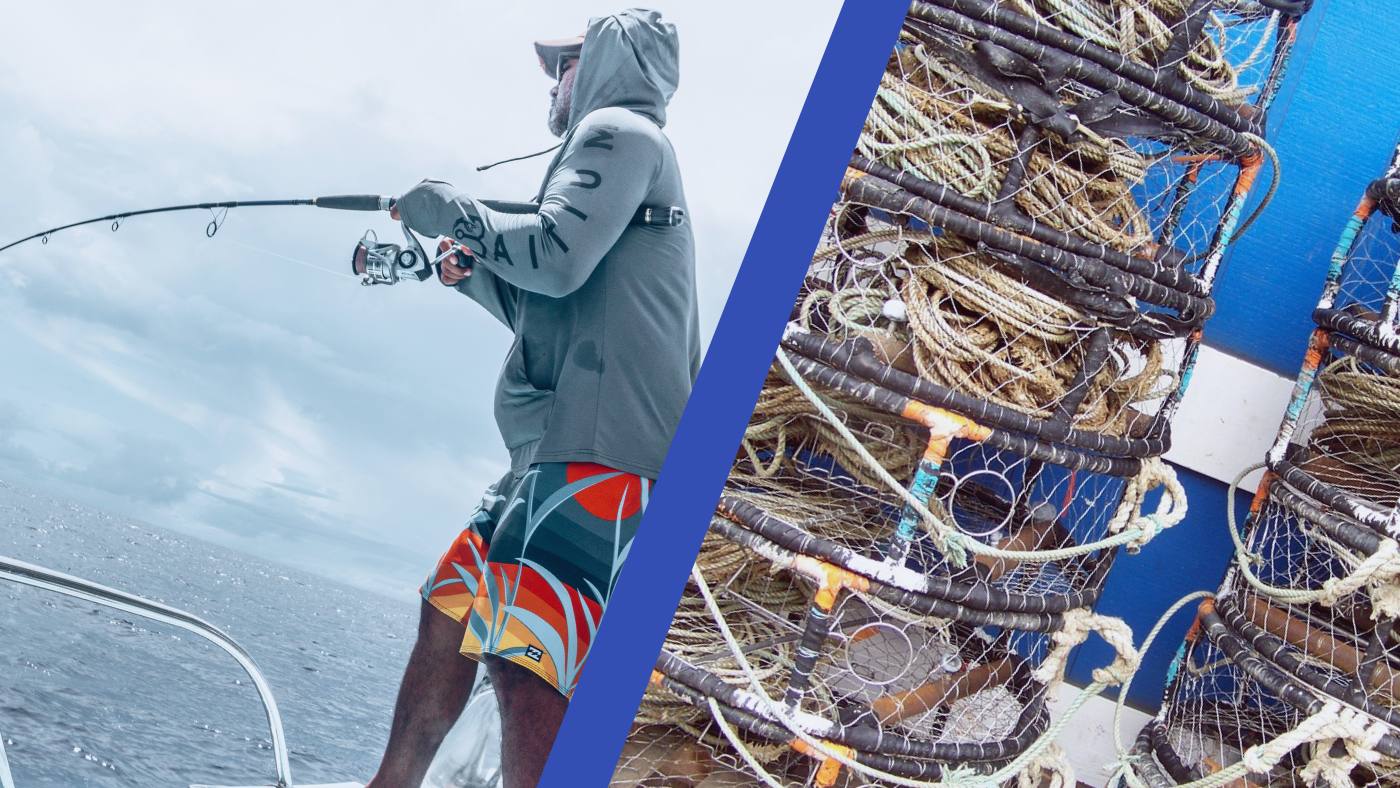Key takeaways
- Crabbing uses traps with bait like fish scraps, requiring patience and strategic placement, while fishing involves casting lines and reeling skills.
- Gear differs: crabbing needs pots, ropes, buoys, and trap tags; fishing requires rods, reels, hooks, lines, and various baits or lures.
- Regulations for both include licensing, catch limits, and gear rules, but specifics vary by location and activity type.
Crabbing and fishing both involve catching water creatures, but they are quite different in how they work, the gear used, and the rules that one must follow. In this article, I’ll break down their differences to help you decide whether to fish or crab, get the right equipment, and use the best strategies out on the water.
Table of Contents
1. Popularity
Fishing is done a whole lot more in the United States. According to NOAA, around 200 million fishing trips were taken in 2020, mostly from shore. Crabbing is more popular in certain areas, like the Chesapeake Bay in Maryland.
Even though they're very different, both are fun ways to spend time on the water in the right region.
2. Techniques

Crabbing involves setting traps or cages to capture crabs. These traps, typically baited with fish scraps, clams, squid or chicken or turkey necks, lure crabs in but prevent their escape. It involves patience and strategic placement as crabbers wait for crabs to enter their traps.
Fishing requires casting a line using a rod and reel, and then waiting for fish to bite the bait attached to the hook. This activity involves skills such as casting and reeling in the catch with finesse.
3. Gear
For crabbing, the gear includes crab pots or traps, nylon rope for float lines, and marker buoys. Crab traps need to be tagged to identify the owner and comply with local regulations.

In fishing, the gear involves fishing rods and reels, hooks, lines, and sinkers. The type of bait varies, including options like worms, artificial lures, or small fish. We discuss the different kinds of fishing lure as well as unusual fishing lures in separate posts.
4. Regulations
Regulations for crabbing include licensing requirements, seasons, size and catch limits, and other important guidelines.
For example, in Washington state, sport crabbers aged 15 and above must have a Washington fishing license with a crab endorsement. They must report their Dungeness crab catch on separate summer and fall/winter catch record cards.
In Virginia, licenses are needed for using one crab trap or pound, crab trotline up to 300 feet, and 3 to 5 recreational crab pots with or without terrapin excluder devices.
There are also rules for the type of bait allowed and requirements for the traps, like having escape vents for undersized crabs.
Meanwhile, fishing regulations vary based on location and species targeted, often including limits on size, number, species of fish that can be caught, licensing requirements, and gear and bait that may be used.
For comprehensive and region-specific information, it's best to consult the relevant fish and wildlife agency's website where you're fishing or crabbing.
5. Seasonality and Accessibility
Crabbing can be done year-round in most places, except during specific closures for conservation purposes. Fishing seasons can vary greatly depending on the fish species and location.
6. Ethics and Sustainability
Both activities demand a commitment to conservation. In crabbing, it’s important not to overharvest and to check traps regularly to prevent ghost fishing.
Don't miss our post Where Have All The Snow Crabs Gone? for more insight on conservation efforts.
Fishing also demands responsible practices, such as following catch limits and size restrictions to maintain fish populations. If you're curious about whether overfishing is still a problem, check out this post.
Conclusion
While both can be fun outdoor activities, fishing and crabbing are quite different in what they involve. Thinking about if you want to catch finfish or shellfish, what kind of gear you need, and the separate skills for each can help make sure your next day out on the water goes smoothly!
For the latest updates, hacks, and expert tips and tricks on fishing, be sure to check out our other blog posts.
MOST READ NEWS:
How To Use Your Fishing Records to Catch More Fish
Track your fishing trips, analyze patterns, and refine your techniques with a fishing log to catch more fish on every outing!
Solo Fishing Safety Tips: Stay Safe and Enjoy the Outdoors
Learn essential solo fishing safety tips: gear checklist, boat safety, emergency preparedness, weather monitoring & fishing location scouting. Stay safe on the water.
Secrets to Winter Fly Fishing Success
Master winter fly fishing with expert tips on trout behavior, essential gear, and proven techniques. Learn the secrets to catching more fish in cold weather.
How Cold Water Changes Fish Behavior: Insights for Anglers
Explore how cold water affects fish behavior and fishing techniques, enhancing your angling success and strategy.
Is Tech Making Fishing Too Easy? Exploring Forward-Facing Sonar (FFS)
Learn about forward facing sonar in fishing - what it is, how it works, rules for tournaments, ethics, and tips for finding fish with this game-changing technology.
Plan Your Best Fishing Trip Yet this 2025: A Complete Guide
Plan your fishing trip this off-season. Learn to choose destinations, prep gear, pick bait, and trust Baitium for expert tools and tips!
15 Fishing Resolutions for 2025: Set Yourself Up for Success
Discover 15 essential fishing resolutions for 2025: tackle organization, gear maintenance, angling techniques, conservation tips, tournament prep, and fishing safety guidelines.



